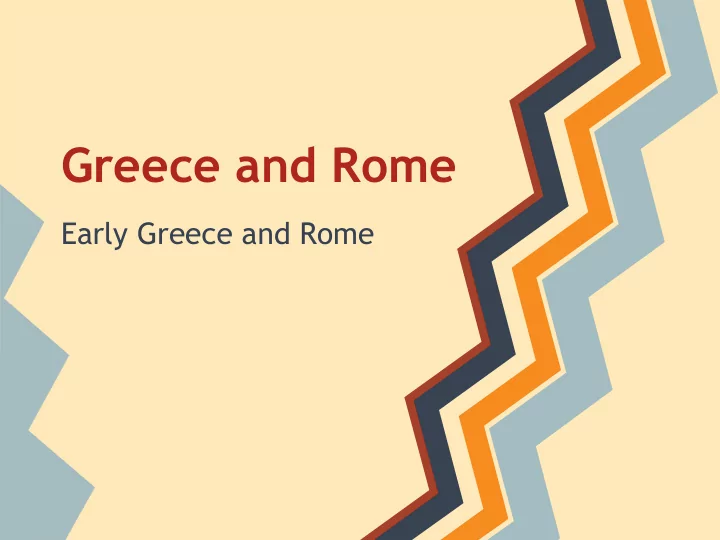

Greece and Rome Early Greece and Rome
The Persian Wars Greece’s Finest Hours
Where is Persia?
Why Fight? • Greeks had been settling on the west coast of Asia Minor (Persia) • Persia conquered these colonies • In 499 B.C. Greeks in these colonies revolted against Persian rule (they were used to ruling themselves—democracy) • Athens sent troops to support the revolt
Crushing the Revolt • Emperor Darius of Persia crushed the revolt rather quickly • He decided to punish Athens for helping the colonies • After training for a few years Darius sent troops to invade Greece • Sailed on to the Bay of Marathon
The Battle of Marathon • Athens asked Sparta to help, but Spartan troops would not arrive for 9 days (they were in the middle of religious festivals) • Other jealous city-states decided not to help Athens against the Persian Empire • So Athens took on the mighty Persian Empire by themselves
A Serious Mismatch • Persian troops—100,000 • Athenian troops—20,000 • Did Athens really have any hope against these odds?
Victory • The Athenian army was well-trained and did not break formation as they charged the Persian lines • The organized charge surprised the large but scattered (and poorly organized) Persian army • The Persian soldiers turned and ran from the oncoming Athenians
A Slaughter • The Athenian army almost drove the Persians back to the sea • Final tally – Persians—6, 400 dead – Athens—192 dead – Darius returned to Persia never to return
Connection to the Past • The modern marathon has its roots in the Battle of Marathon • A Greek soldier, Phidippides, ran from Marathon to Athens (26 miles) to tell the Athenians of the Greek victory and to warn them that the Persians may try to attack • Phidippides died from exhaustion after delivering his message • Today’s 26 mile marathon races remember his heroic act of martyrdom
Back for Revenge • The Persian Emperor Darius never returned, but his son Emperor Xerxes did • In 480 B.C. the Persians returned to Greece • They brought even more men this time around
The Battle of Thermopylae • Persians met a force of Greeks at Thermopylae • This was a small mountain pass that controlled access to all of Greece • For two days 7,000 Greeks held the Persians back, but…
The Downfall • A Greek traitor showed the Persians a secret passageway • This allowed the Persians to sneak up from behind and attack the Greeks • Most of the Greek defenders ran away
A Heroic Act • About 300 Spartans stayed behind and fought to their deaths • This allowed the other Greeks to escape capture or certain death
Here come the Persians • The Persians poured into Greece • They got their revenge by wreaking havoc • They even burned Athens to the ground • What were the Greeks to do?
The Battle of Salamis • As their city-state burned the Athenian people and the army escaped to the island of Salamis • The Persians were quick to follow the retreating Greeks to Salamis
Those Clever Athenians • The Greeks ships first sailed from shore like they were fleeing the island • They then turned quickly around and began ramming the Persian ships • Before the Persians knew what had happened half of their fleet was on the ocean floor • The Persians once again retreated back to Persia
The Final Battle • The Battle of Plataea • The Greeks and Persians at equal strength • Athens and Sparta fought side by side • Greek military superiority won out and Persia retreated for good
How did the Greeks do it? • Three reasons – Inherent advantage of the defender – They were better soldiers – They used the element of surprise
Greece ● Greek civilization developed with Egyptian influence on the island of Crete in 2000 BC ● Early kingdom in southern Greece developed in Mycenae - movie Troy. ● Kingdom fell to other Indo-European invaders.
Greece ● Between 800 and 600 BC rise of civilization based on creation of strong city-states ○ regions controlled by a strong government in a city within that region. ○ Greece did not have one central government ● Unified written and spoken language spread throughout the Greek city-states ● Sparta and Athens - two leading city-states
Greece - Sparta and Athens ● Sparta ○ strong military aristocracy dominating a slave population ● Athens ○ commercial state, also had slaves, and artistic and intellectual leadership. ● 500 -449 BC both states worked together, along with smaller states to defeat a huge Persian invasion - movie 300.
Greece - Pericles ● Dominated Athenian politics in 5th century BC ● Democratic political structure in which each citizen could participate in city-state assemblies to select officials and pass laws. ● Ruled through wise influence and negotiation.
Greece - Athens and Sparta ● Political decline caused both Athens and Sparta to fight for control of Greece. ● Peloponnesian Wars (431-404 BC). ○ Philip of Macedonia won crucial battles ○ His son Alexander conquered much of the Persian Empire. ○ Alexander the Great died at age 33 after 13 years of breathtaking conquests.
Greece - “Hellenistic” ● Greek art and culture merged with other Middle Eastern forms. ● Name Hellenistic derived from the influence of the Hellenes - the Greeks. ● Consolidation of Greek civilization even after the political decline of Greece itself, and some important new developments.
Recommend
More recommend